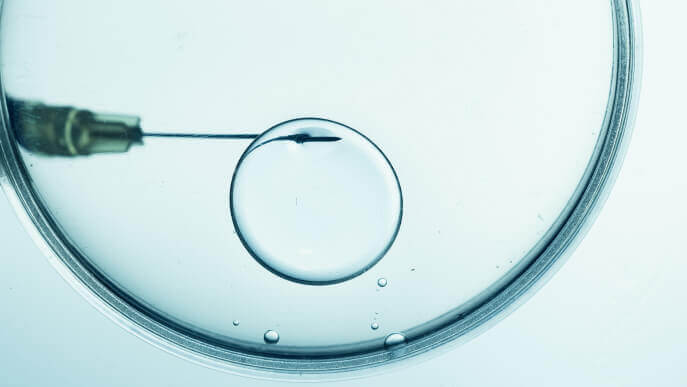In-Vitro Fertilisation (IVF)
In–Vitro Fertilisation (IVF)
In Singapore, in-vitro fertilisation (IVF) is gaining traction as a solution for couples facing

Dr Michael Wong, Medical Director & Senior Consultant Urologist
FAMS (Urology), FICS (USA), FRCS (Edinburgh), M Med (Surgery), MBBS (Singapore)

What Is In-Vitro Fertilisation (IVF)?
In-vitro fertilisation (IVF) is a form of assisted reproductive technology (ART) that is used to help couples struggling with infertility to conceive. IVF treatment is a complex and incredible procedure that combines medicine and surgery to fertilise an egg with a sperm (both carefully selected to be of the highest possible quality) outside of the body.
The fertilised egg, known as an embryo, can be frozen for later use or immediately implanted into a woman's uterus.
Am I Suitable for
IVF in Singapore?
Most IVF doctors recommend IVF after other treatments have proved unsuccessful. In Singapore, IVF treatment is an option for married couples struggling with infertility due to a variety of factors, including:
Blocked or Damaged Fallopian Tubes
Blockages or damage in the fallopian tubes can prevent the egg from meeting sperm.
Endometriosis or Uterine Fibroids
Endometriosis can hinder implantation, while fibroids might affect the uterine cavity.
Ovulation Disorders or Reduced Ovarian Reserve
Women with irregular ovulation, diminished egg quality due to age, or Polycystic Ovary Syndrome (PCOS) tend to face fertility issues.
Age-Related Infertility
Women over 40 naturally experience a decline in fertility.
Low Sperm Count or Quality
Men with a low sperm count or poor sperm motility tend to struggle with infertility.
Genetic Disorders
For couples with certain genetic conditions, IVF can be coupled with preimplantation genetic diagnosis (PGD) to screen embryos for the disorder, increasing the chances of a healthy pregnancy.
Unexplained Infertility
Even after a thorough evaluation, some couples experience unexplained infertility.
Wondering if IVF is right for you? Speak to our IVF specialists and explore your options.
How to
Prepare for IVF Treatment
Preparation is a key factor in achieving the best possible outcome for IVF treatment. During your initial consultation, we will discuss your medical history, expectations and a personalised treatment plan to ensure you are well-prepared for the procedure. Beyond the medical steps, combining emotional support with positive lifestyle modifications can significantly improve your chances of success.
Here are some proactive steps recommended for both males and females before starting IVF:
Open Communication
Maintain open and honest communication with your partner to ensure you are supporting each other through every step of the journey.
Uterine Examination
To assess the uterus for any structural issues that may affect implantation.
Pre-IVF Semen Analysis
For males, to evaluate sperm quality and identify any issues early on.
Practice Embryo Transfer
A trial run to ensure smooth and accurate embryo placement during the actual procedure.
Blood Tests for STIs and Other Infections
To ensure optimal reproductive health and prevent transmission during treatment.
Stress Management
Engage in stress-relieving activities like yoga, meditation, or light exercise to support hormone balance and reproductive health.
Taking these steps not only optimises your body for IVF but also provides peace of mind, setting the foundation for a smoother and more successful fertility journey.
What Is the
Step-by-Step Process of IVF Treatment?
An IVF cycle consists of several stages, as follows:

Stage 1: Ovarian Stimulation
The IVF process includes the extraction of multiple eggs from a woman's body. As women are only capable of producing one egg per menstrual cycle, a specialist skilled in IVF will train the woman to administer daily injections of follicle-stimulating hormones (FSH) in order to stimulate her ovaries to produce multiple eggs at a time.
Stage 2: Ovarian Follicle Monitoring
IVF surgeons will conduct regular blood testing and ultrasounds to monitor the ovaries and measure hormone levels and follicle development. With this, the timing of egg collection can be accurately determined. Following this, human Chorionic Gonadotropin (hCG) injections will be used to trigger the final stage of egg maturation. The egg retrieval will then take place approximately 34 to 36 hours following the hCG injection.
Stage 3: Oocyte/Egg Retrieval
In general, eggs or oocytes are ready for collection and fertilisation when they reach a size of 17–18mm. The egg retrieval procedure is usually performed under general anaesthesia. A thin needle guided via a transvaginal scan will be used to retrieve the eggs from the follicles.
Stage 4: Fertilisation of Egg with Sperm
Upon collection of a fresh sperm sample from the man (or a frozen sample, if using a sperm bank), it will be processed and examined in an IVF clinic laboratory. An embryologist will determine the best quality sperm, and introduce it to the selected egg. An embryo will then develop if the fertilisation is successful.
Stage 5: Embryo Transfer
Embryos of good quality can be frozen for future use or immediately transferred into the woman's uterus, in the hopes that they will implant into the uterine lining and result in pregnancy.
What Is the
Success Rate of IVF Treatment in Singapore?
Age is the primary factor affecting the success rate of IVF. It is estimated that among women aged 35 to 39, the percentage of live births stands at close to 40%; as for women in their 40s, the percentage of live births falls to the single digits. This is because older women have fewer eggs, less healthy eggs, as well as a higher risk of developing medical issues that can impact fertility (e.g. uterine fibroids).
How to Improve the
Success Rate of IVF Treatment?
To increase the chances of successful IVF treatment, it is crucial to seek an accredited assisted reproduction centre and an experienced IVF specialist. Additionally, your doctor may also recommend the following:
Consider Supplements
For women, consult your doctor about folic acid and vitamin D to potentially enhance pregnancy success.
Optimise Sperm Health
For men, avoid high temperatures (hot tubs, saunas, tight clothing) and discuss medications with your doctor.
Rubella Vaccination
Women should ensure that they are immune to rubella to prevent birth defects during pregnancy.
Lifestyle Changes
Maintain a healthy weight through balanced diet and exercise, quit smoking, and limit alcohol intake.
Let us help you start building the family you have always envisioned.
Contact our IVF clinic in Singapore and begin your journey to parenthood.
How Many IVF Cycles Do People Usually Need?
Generally speaking, anywhere between 3 and 6 cycles can result in a successful birth. Of course, there are couples who require more or even less than the average.
Potential Risks of IVF Treatment
While it is a viable solution for couples dealing with infertility, IVF treatment may carry potential risks, including:
Multiple Pregnancies
Transferring multiple embryos increases the chances of multiple pregnancies, which can carry a higher risk of complications like preterm birth, low birth weight, and C-sections.
Ectopic Pregnancy
This is a rare but serious complication where a fertilised egg implants outside the uterus, usually in the fallopian tubes.
Ovarian Hyperstimulation Syndrome (OHSS)
This is a more serious complication that occurs when the ovaries overreact to fertility drugs. Symptoms include severe bloating, difficulty breathing, nausea and vomiting, dehydration, and urinary problems.
Pelvic Infection
There is a slim chance of pelvic infection after egg collection, with symptoms like pain, bleeding, and fever. In very rare cases, a pus-filled abscess may also develop.
FAQs about IVF
What is the best age to undergo IVF?
Is IVF painful?
How much does IVF in Singapore cost?
How long does it take to know you are pregnant after IVF?
How soon after a failed IVF procedure can you try again?
Can you select the gender during IVF?
Can IVF cause birth defects?
Our Fertility Specialist in Singapore
Dr Michael WongDr Michael Wong is the medical director and senior consultant urologist at the International Urology, Fertility and Gynaecology Centre. With advanced training in urology, fertility and minimally invasive surgery from leading centres in the USA, he is internationally recognised for his expertise. He is internationally recognised for his expertise and has co-founded Singapore’s first joint urology–gynaecology clinic for couples, where both partners are evaluated together. His practice integrates evidence-based approaches to male and female infertility care.

Let us help you
Restore your urological health.
Make an appointment with Dr Michael Wong to receive a tailored, supportive and targeted care plan.
Office
Location
3 Mount Elizabeth Road, #10-09,
Mount Elizabeth Medical Centre,
Singapore 228510
Contact
Number
| Tel | |
| Tel | |
| Fax | : (65) 6838 1216 |
| 24-hour answering service |
Email
Address
Opening
Hours
Mon-Fri | : 9:00am - 1:00pm |
Sat | : 9:00am - 12:00pm |
Sun/PH | : Closed |
Blog





